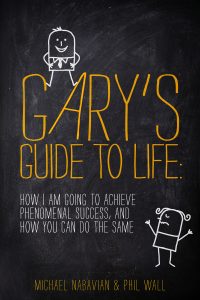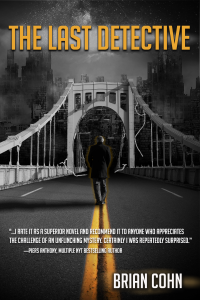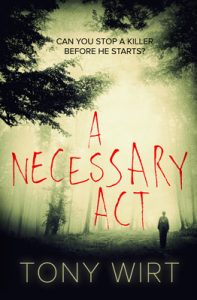The Rundown
The Recommendation
The Rating
The Links
The Reviewer
Renee Miller
Visit Renee Miller‘s website.Fictitiously, of course. I don’t want you nutjobs actually killing anyone. No. I want to talk about killing off characters in books, because some of us are out of control, just running around, knocking characters off like they grow on trees. You can’t just kill a character because you’re bored with him. You can’t just hit him with a bus because it’s shocking and you want to shake the reader up. And you can’t do it because it’s gross and you really like gross.
Unless you write absurdist horror… then kill away, my friend. You just kill away.
The rest of you listen up. Killing characters is an art form. It requires skill and forethought, and it should have a sort of beauty to it. Sick, twisted, violent beauty. Gives one shivers, eh?
Because I sometimes do a lot of killing in my stories, I have a murder file. It’s filled with believable ways to kill off a character and ridiculous ways, because I write suspense/thrillers and I also write comedy. I almost never look at it anymore, but its existence reminds me that killing off my “darlings” shouldn’t be easy. I had to research every murder/death scenario in that file, and I’m reminded of the time and care it took to select each one.
The best example of killing off character the right way is the Game of Thrones series of books. George R. R. Martin is brilliant at killing his darlings. Readers tremble and although his books move very slowly sometimes, we’re always at the edge of our seats, terrified to fall in love with a character, because we know that character is probably going to die. And when he does, we still keep reading. Why?
Mr. Martin’s deaths aren’t just done for shock value. He makes sure the remaining characters are so enticing, we can’t help ourselves, and the story that follows is more interesting than the deaths. Oh, we’re pissed about the killing, and some of us even grieve (Oh Rob Stark, how I loved thee), but we have to know who’s next (good thing I love Jon Snow the most…).
Now, some of you might be inspired by Martin’s success in this area. You might think killing everyone is going to make your book as successful.
No.
Before killing off a character, sit down and think about it. While you’re thinking, ask yourself what, when, how, why, where, and who?
- Who are you going to kill? When you ask this, think about which character adds the most to the story by dying.
- Why is he dying? Which one will deepen the plot? When a character dies, his death should satisfy the reader in some way; add depth to the plot; or reveal something about someone or something the reader cares about. If you’re not sure why a character is dying, then he shouldn’t die. There has to be a reason. If there’s no purpose to the death, the reader will question your motivation. Does the character deserve to die? Will his death reveal something about other characters? With this character gone, is your story better or worse?
- How do you want the reader to feel about it? Do you want her pissed off? (Careful with this one, folks.) Do you want her sad, happy… what should she feel? Is this character’s death going to evoke these emotions? If not, then it’s a waste of a good scene. Save it for later.
- When and how will it happen? This is important, because the death should be memorable and believable, and it needs to happen at the right time. Research the scenario first, so that you aren’t writing something that is so implausible, the reader is all, “What the actual fu—?” If it’s to be sudden, make sure it’s at a point in the story that it won’t draw the reader’s attention away from other, more important events.
- Is it predictable or cliché? Sometimes the usual methods work best when killing off a character, particularly if the death itself is horrifying/shocking/sad enough for the reader. Other times, like when it’s not a main character, or the pace is kind of sluggish, you might want to get a little more creative. A unique, never been done before death is sometimes the better way to go.
- Is he going to stay dead? In reality-based fiction, characters usually stay dead. However, if you don’t have a body… you know what I mean. If you’re going to make the character return from the dead (always a fun twist in fantasy novels), make sure his death scene isn’t tied with a neat little bow. You’ll need a back door, or a way to bring him back that is believable. If he’s going to stay dead, and you killed him in a way that leaves no question as to his deadness, you leave him that way. Hear?
- Did you lay the groundwork? Every death should have some foreshadowing. You don’t have to literally tell your reader this guy’s going to die, but when it happens, she should be able to see it coming in hindsight. On the other hand, unexpected deaths can be wonderful, but make sure the events leading to it make sense. If the death is going to be sudden, pay attention to the aftermath. How does the death affect other characters, events, etc. in your story? Remember to make the most of the emotions death can give to the reader.
- Where does his death leave the rest of the characters? Is the story interesting without the dead character in it? You wrote an amazing death scene. It’s exquisite. Perfection. No one will ever write a more shocking, soul shattering death scene ever again. Good for you. Well done, but is it the end of your story? If it's not, don’t let the death scene be the last interesting thing that happens.
Now that you’ve thought about the death long and hard, plot it. Outline or sketch the scene. Pay attention to details, because the reader will. After you’ve written or outlined the death, compare it to these handy checklists:
Killing off a character should do one or more of the following:
- Advance the plot
- Motivate other characters
- Reveal a twist, solution, question, motivation, etc.
- Provide a satisfying consequence to the character’s actions
- Evoke emotion in the reader
Killing off a character should NOT do any of the following:
- Shock for the sake of shock and nothing more
- Remove a character you’re bored with
- Tie off a loose end you ‘ve created and don’t know how or are too lazy to resolve
- Create an opening for a more interesting character or plot twist
Now you’re ready to commit murder, so go on, killer. Make them bleed.










